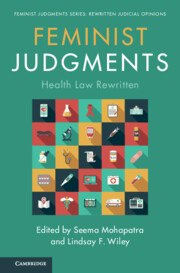Book contents
- Feminist Judgments: Health Law Rewritten
- Feminist Judgments Series Editors
- Feminist Judgments: Health Law Rewritten
- Copyright page
- Contents
- Advisory Panel for Feminist Judgments Series
- Titles in the US Feminist Judgments Series
- Advisory Panel for Feminist Judgments: Health Law Rewritten
- Contributors
- Acknowledgments
- 1 Introduction
- 2 Commentary on Schloendorff v. Society of New York Hospital
- 3 Commentary on Reynolds v. McNichols
- 4 Commentary on Conservatorship of Valerie N.
- 5 Commentary on Bouvia v. Superior Court
- 6 Commentary on Moore v. Regents of the University of California
- 7 Commentary on Linton v. Commissioner of Health and Environment
- 8 Commentary on Olmstead v. L.C. ex rel. Zimring
- 9 Commentary on Doe v. Mutual of Omaha
- 10 Commentary on Smith v. Rasmussen
- 11 Commentary on Burton v. State
- 12 Commentary on National Federation of Independent Business v. Sebelius
- 13 Commentary on Means v. United States Conference of Catholic Bishops
- 14 Commentary on Does v. Gillespie
- 15 Commentary on National Institute of Family and Life Advocates v. Becerra
6 - Commentary on Moore v. Regents of the University of California
Published online by Cambridge University Press: 15 December 2022
- Feminist Judgments: Health Law Rewritten
- Feminist Judgments Series Editors
- Feminist Judgments: Health Law Rewritten
- Copyright page
- Contents
- Advisory Panel for Feminist Judgments Series
- Titles in the US Feminist Judgments Series
- Advisory Panel for Feminist Judgments: Health Law Rewritten
- Contributors
- Acknowledgments
- 1 Introduction
- 2 Commentary on Schloendorff v. Society of New York Hospital
- 3 Commentary on Reynolds v. McNichols
- 4 Commentary on Conservatorship of Valerie N.
- 5 Commentary on Bouvia v. Superior Court
- 6 Commentary on Moore v. Regents of the University of California
- 7 Commentary on Linton v. Commissioner of Health and Environment
- 8 Commentary on Olmstead v. L.C. ex rel. Zimring
- 9 Commentary on Doe v. Mutual of Omaha
- 10 Commentary on Smith v. Rasmussen
- 11 Commentary on Burton v. State
- 12 Commentary on National Federation of Independent Business v. Sebelius
- 13 Commentary on Means v. United States Conference of Catholic Bishops
- 14 Commentary on Does v. Gillespie
- 15 Commentary on National Institute of Family and Life Advocates v. Becerra
Summary
Moore v. Regents of University of California was a California Supreme Court case from 1990 adjudicating the claims of a patient whose tissues were used to produce an immortal cell line. Though Moore consented to several procedures, his physician did not inform him that his cells were valuable to the physician’s research and economic interests. The original opinion recognized Moore’s claims for breach of fiduciary duty and informed consent but rejected his claim for conversion (a tort claim for theft). Professor Lisa Ikeomoto’s feminist judgment illuminates the role of informed consent in transforming the doctor-patient relationship from one that is paternalistic to one premised on patient rights and recognizes the role of the women’s health movement in achieving that transformation. In recognizing the plaintiff’s property-based tort claim, she also discusses how the grievance Moore is expressing is about exploitation by an industry based on commercializing cells and tissues. In her commentary, Professor Jessica Roberts highlights that courts have recently become more receptive to recognizing robust legal rights for individuals who provide tissue and data for research purposes.
- Type
- Chapter
- Information
- Feminist Judgments: Health Law Rewritten , pp. 118 - 158Publisher: Cambridge University PressPrint publication year: 2022

